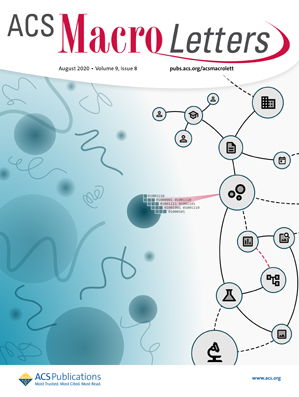Thiazole Groups without Hydrogen-Bond Donors Endow PIM Membrane with High CO2 Separation Performance
IF 5.1
Q1 POLYMER SCIENCE
引用次数: 0
Abstract
Polymers of intrinsic microporosity (PIMs) are promising membrane materials for CO2 separation, but suffer from the trade-off effect between permeability and selectivity. And it is a challenge to design suitable groups in PIMs to improve the CO2 separation performance. Herein, this work reports that thiazole groups without hydrogen-bond donors could endow the PIM membrane with high CO2 permeability and separation selectivity. The abundant N atoms of the thiazole groups could provide Lewis acid–base interactions with CO2 and significantly enhance the solubility selectivity. The lack of hydrogen-bond donors and the rigid structure of thiazole unit could inhibit the pore collapse and enhance the permeability and stability of PIM membranes. The resultant PIM membranes exhibit CO2/N2 and CO2/CH4 selectivities of 36.6 and 22, respectively, with corresponding CO2 permeabilities of 9196 and 3801 Barrer. This work provides new insights into the rational design of functional groups for PIMs with high gas separation performance.

无氢键给体的噻唑基团使PIM膜具有较高的CO2分离性能
本征微孔聚合物(PIMs)是一种很有前途的CO2分离膜材料,但其渗透性和选择性之间存在权衡效应。如何设计合适的基团来提高PIMs的CO2分离性能是一个挑战。本文报道了没有氢键给体的噻唑基团可以使PIM膜具有高的CO2渗透性和分离选择性。噻唑基团丰富的N原子可以与CO2发生Lewis酸碱相互作用,显著提高了溶解度选择性。氢键给体的缺乏和噻唑单元的刚性结构可以抑制PIM膜的孔坍塌,提高膜的渗透性和稳定性。所得PIM膜的CO2/N2和CO2/CH4选择性分别为36.6和22,相应的CO2渗透率分别为9196和3801 Barrer。本研究为高效气体分离pim的官能团合理设计提供了新的思路。
本文章由计算机程序翻译,如有差异,请以英文原文为准。
求助全文
约1分钟内获得全文
求助全文
来源期刊
CiteScore
10.40
自引率
3.40%
发文量
209
审稿时长
1 months
期刊介绍:
ACS Macro Letters publishes research in all areas of contemporary soft matter science in which macromolecules play a key role, including nanotechnology, self-assembly, supramolecular chemistry, biomaterials, energy generation and storage, and renewable/sustainable materials. Submissions to ACS Macro Letters should justify clearly the rapid disclosure of the key elements of the study. The scope of the journal includes high-impact research of broad interest in all areas of polymer science and engineering, including cross-disciplinary research that interfaces with polymer science.
With the launch of ACS Macro Letters, all Communications that were formerly published in Macromolecules and Biomacromolecules will be published as Letters in ACS Macro Letters.

 求助内容:
求助内容: 应助结果提醒方式:
应助结果提醒方式:


